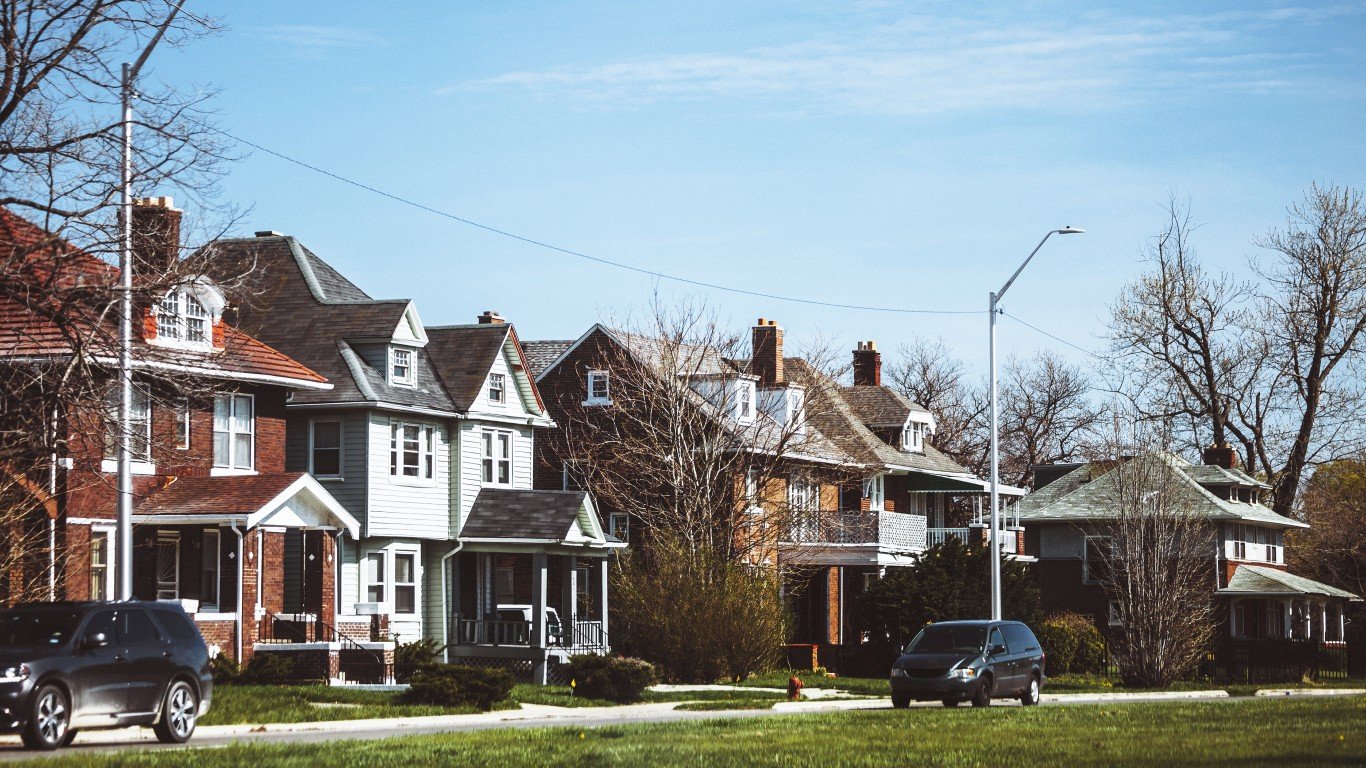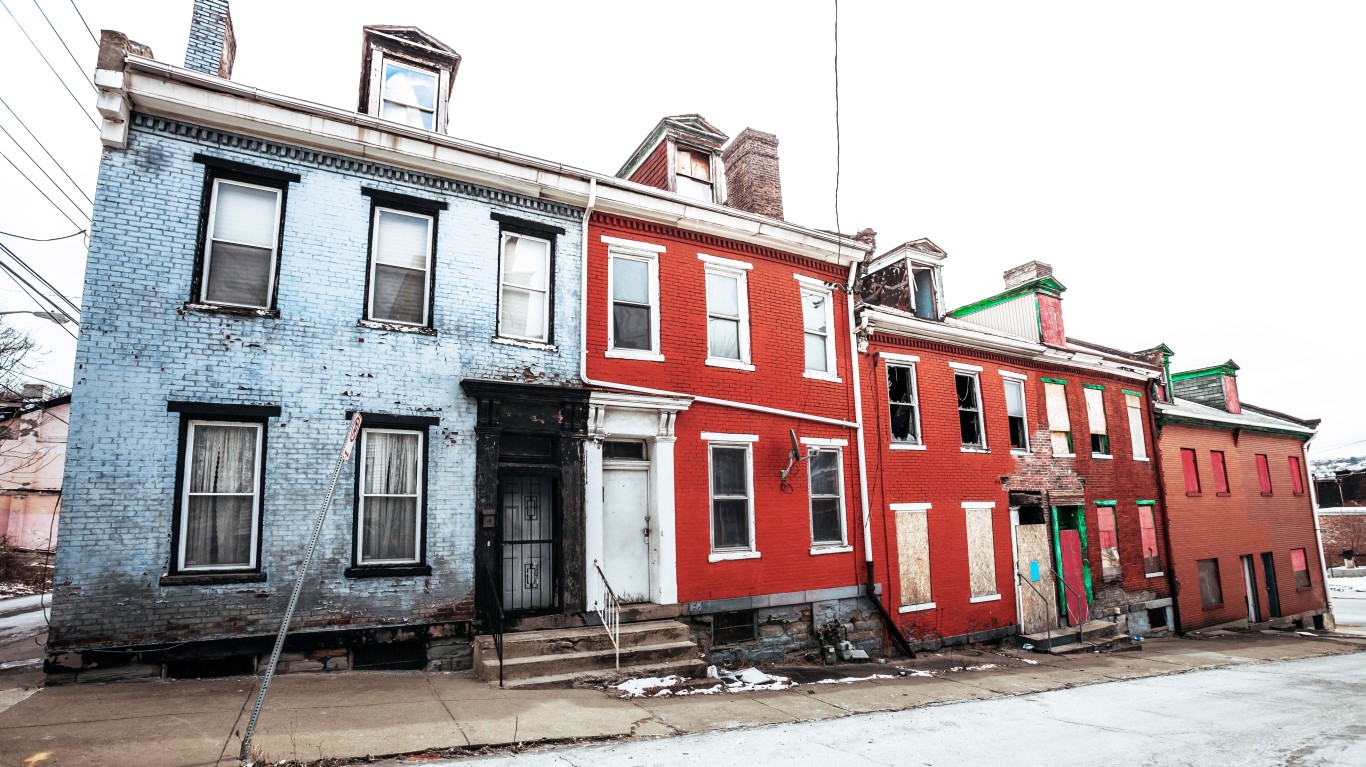Homeowners and real estate agents know how to attract buyers and ensure a successful sale: improve curb appeal, paint, declutter and ask a reasonable market price. While these are easy steps to take, houses can have difficult to discover problems that can significantly lower their price. In some cases, the problems are so severe that they can stop a sale completely. Source: Thinkstock
Source: Thinkstock
24/7 Wall St. analyzed several of the pitfalls owners should know about and that discerning buyers can discover. All states have mandatory disclosure laws that require home sellers to disclose any material property defect. In some cases, the sellers may not be aware of a defect they have lived with for years and are not trying to hide the issues. There may be problems that existed before the current owner bought the home or that were added inadvertently as a property was altered. Failing to disclose these can lead to lawsuits when the defects are eventually found. Material defects regulations can vary from state to state, which can further complicate the process of purchasing of a new home.
Most home buyers and home sellers are likely to pay the few hundred dollars for a home inspection, which can save both parties money and grief later. This is particularly true for older homes. Still, even good house inspectors have limits to what they can inspect. Often, they are unable to check inside or under the structure and are restricted to what they can see or reach. Not many buyers or sellers opt for a more thorough inspection, which is much more expensive and time-consuming.
Material defects in a house can affect the sale price substantially, or even be deal breakers. They often involve water issues such as old pipes, as well as hazardous materials and structural problems, but are hardly limited to that. When asked to name some of the problems, a home inspector might or might not find on a property that could cause a buyer to refuse to go through with the purchase, Frank Lesh, executive director at the American Society of Home Inspectors (ASHI), said, “A severe structural problem. For example, leaning or cracked foundation, excessive mold, or water damage.”
ALSO READ: Most and Least Expensive Home Markets in America
Nick Gromicko, founder of the International Association of Certified Home Inspectors (InterNACHI) told 24/7 Wall St. that about one-quarter of the home inspection industry is related to testing for mold because it can cause such serious health problems. “Mold is a health issue which many young families wish to avoid. There is sometimes a feeling that mold will never go away,” added Lesh.
Here then are 10 problems that may make selling a house either more difficult or even impossible.
1. Leaded Paint
Residential use of leaded paint was banned in the United States in 1978. Any house built before that date is likely to have leaded paint in at least some layer of old paint that has since been covered with non-leaded paint. According to the U.S. Centers for Disease Control (CDC), approximately 24 million housing units have deteriorated leaded paint and elevated levels of lead-contaminated house dust. More than 4 million of these dwellings are homes to one or more young children, who are especially susceptible to the effects of lead. If homeowners are selling a house built before 1978, they must comply with a federal law that imposes several notification and disclosure obligations on the sellers.
2. Asbestos
Asbestos was once used in a variety of home construction products, including siding, duct insulation, blown-in attic insulation, vinyl floor tiles and glues, among others. If the product containing the asbestos is intact and will remain undisturbed, homeowners are under no obligation to act. However, if the asbestos is exposed or the product could suffer some damage over time, it needs to be encapsulated — primed and painted with good quality latex paint, for example — or covered (totally enclosed). When the product is deteriorating, homeowners should either repair the problem area, which is pricey but not sky-high, or have it removed, which can be very expensive.
While homeowners should disclose the presence of any asbestos-containing material to potential buyers, they are not legally required to do so in many states or by the federal government. In Massachusetts, for example, sellers are required to disclose the presence of lead paint and urea formaldehyde foam insulation but not asbestos.
3. Mold
Black mold is a potential environmental problem that will scare off buyers quicker than just about any other problem. If the mold is not visible but dampness in the walls, floors, or ceilings is apparent, then mold of some kind is almost certainly growing. In most cases, getting rid of mold is far more costly than preventing moisture from attacking the lumber, sheetrock, ceiling tiles and other wood products that mold spores love. Some molds are toxic, and even those that are not may cause allergic reactions in some people.
A professional mold inspection gives the seller a signed report from before the house is listed for sale. Buyers may choose to conduct their own testing as well, but at least the seller has a better chance of completing a sale with a satisfactory mold report. However, unlike leaded paint, there are no federal regulations for mold inspections or remediation. In 2012, Virginia rescinded legislation regulating licensing for mold inspection and remediation after just one year in effect due to the lack of federal standards.
ALSO READ: Best Markets to Flip a Home
4. Foundation Cracks
On average, repairing a crack in a house’s foundation costs about $3,500 but can run as high as $10,000. Most cracks to the foundation are caused by settling, and the first sign can often be a door that no longer closes properly because the door frame has become crooked. Other signs that the house’s foundation may be cracked include cracks in the walls above doorways or where the walls meet the ceiling, sticking windows and cracks in vinyl or ceramic floor tiles. Figuring out if any of these signs indicate a crack in the foundation is a job for a structural engineer. The cost of fixing a foundation crack rises the longer homeowners wait to fix it. Most buyers will shy away from a house with an unfixed foundation crack.
5. Radon
Radon is a radioactive gas created from, typically, the natural breakdown of small amounts uranium in the soil and water, and it gets into the air inside a house. No state requires a test for radon, but most states require sellers to disclose the results of a previous radon test, and some states require a warning about radon in the contract documents. In this case, too, an ounce of prevention may be better than a pound of cure. Sellers should consider having the test done before putting the house on the market because dealing with a problem early, if one exists, may push the sale to a conclusion more quickly.
The U.S. Environmental Protection Agency has set a radon level at which it recommends that homeowners remediate the problem, but the agency emphasizes that there is no safe level of radon. Radon is the second-leading cause of death from lung cancer in the United States. Frank Lesh of ASHI said that radon concerns among buyers are even stronger than they were 10 or 15 years ago, largely due to greater awareness of the issue. He noted, “High radon readings are a big cause for concern. However, radon levels can be reduced to an acceptable level fairly easily. Unfortunately, some buyers don’t want to deal with it even if the seller takes care of it.”
ALSO READ: Buying a House Causes More Anxiety Than Getting a Root Canal
6. Well and Septic Systems
A septic system treats household sewage on properties not connected to a public sewer system, and a well is a private water source for the property. Septic systems and wells are common in rural areas and can be safe and effective for years if well-maintained. However, a failure in any part of the septic system or a well that runs dry can be expensive to repair.
Because replacing a septic system can run into the thousands of dollars, potential buyers are likely to want to know how well the system works and whether it has been tested recently. The tank should not leak and the drainfield should not have any water puddled on top. Of course, any sewage odor is a sign that the system is not working properly. Replacing the drainfield can cost as much as $20,000, while replacing a leaking tank might cost as much as $2,000.
Many places also have regulations related to the proximity of a house’s well to its septic tank or to the property line. These distances vary by state and probably even by county, but a general rule of thumb could be the 100-foot separation between a well and the septic system required by the Federal Housing Administration in order to get an FHA-approved loan to buy the house. The FHA also requires a minimum distance of 10 feet for the septic system from the property line.
7. Polybutylene Piping
Millions of U.S. houses built between 1978 and 1995 in all parts of the country used polybutylene piping for the plumbing system. The piping reacts with oxidants in the water, causing the pipes to degrade and, ultimately, leak. Because the water pipe deteriorates from the inside, discovering the defect is often problematic. The problem is apparently worst in treated public water systems. The damage to a house can be severe. If the house has polybutylene pipes, it is not a matter of whether they will fail but of when, according to home listing service Propex.com. If the sellers know of the polybutylene piping, they should disclose the information and be prepared to either fix the plumbing before selling the house, discount the house at least enough to cover the cost, or change their plans to sell the house.
8. Stigmatized Property
Stigmatized properties belong to a broad category of houses and apartments that have been the scene of a suicide, murder, cult activity and so on, or that have been associated with other misfortunes or crimes — even ghosts. In most states, buyers are responsible to spot a stigmatized property. However, if a potential buyer asks about any stigmas attached to the property, home sellers are generally better off disclosing all they know about the property. While sellers may lose the sale if they disclose it all, they could end up in court if they don’t. Regulations vary widely among states. In California, for example, state law requires disclosures of murders and suicides on the property and any death within the past three years, except in the case of AIDS-related deaths. But Tennessee, Colorado, Pennsylvania and many others have no such requirement at all.
A study of 100 stigmatized homes in 2000 indicated that stigmatized homes sold for an average of just 3% less than comparable listings but stayed on the market 45% longer. That is not always true, however. The condo where Nicole Simpson and Ron Goldman were murdered in 1994 sold for $200,000 less than the price Simpson paid for it. Some stigmatized properties have been demolished rather than put up for sale, or demolished and reappeared as a new house with a different address at the same location. But nothing compares with the danger of buying a former meth house, Nick Gromicko of InterNACHI pointed out. It makes people sick and if a later inspection finds that the house was used as a meth lab, the house is usually destroyed.
While a radon test costs about $150 and remediation costs about $1,000, Gromicko explained, a test for meth costs about $450 but could save the buyer the entire price of the house or tens of thousands of dollars in remediation costs.
ALSO READ: The Least Healthy County in Each State
What about a crazy neighbor? The National Association of Realtors has cited a case in Texas where the sellers were forced to repurchase the house they had sold because they failed to disclose that the next-door neighbor often left her house naked and cursing loudly.
Gromicko told us that undesirable neighbors are the biggest problem for potential home buyers. Sellers are under no disclosure obligation regarding who the neighbors are or how they behave. This is one area where caveat emptor really matters.
Finally, ghosts. In a survey conducted by the National Association of Realtors, more than 60% of respondents to a survey would consider buying a haunted house. The same survey indicated that about 40% of prospective buyers for a haunted house expect to get a discount of up to 30% from the asking price.
9. Problem Drywall
Beginning in 2001 and ending in about 2009, some inexpensive drywall was imported from China and was used in the remodeling and construction of U.S. homes. Between 2004 and 2007, enough of the drywall was imported to build about 35,000 houses, according to a report in The Wall Street Journal.
Not all of the drywall is bad, however, and the tell-tale signs of the problem material are a sulfurous odor and blackening of copper, silver, and other metals from the sulfur gasses emitted by the drywall. The commonly called “Chinese drywall” has been associated with certain types of health problems.
This problem is hard to detect and can be costly to remediate. Complaints about the drywall first came from Florida, where the heat and humidity aided the sulfur emissions.
Frank Lesh of ASHI told 24/7 Wall St. that most of the Chinese drywall problems have been resolved and that most buyers were unaware of the issue.
ALSO READ: The Poorest Town in Each State
10. Zoning
Issues related to zoning could play a role in any house sale. If the buyer wants to build an addition or tear down a part or all of the house and build something else, zoning regulations could kill a deal if such changes are not permitted. Zoning is a local issue, and in an incorporated city there are probably at least two zones — residential and commercial — and sometimes more.
For example, a house that exceeds current zoning ordinances usually got there before the rules were written and is called non-conforming. It cannot be enlarged without getting a variance, and getting a variance is not guaranteed. And that’s not all. If the house is more than 50% destroyed by fire or some natural disaster, it cannot be replaced without a variance.
Local governments usually approve changes if the alterations do not change the footprint of the building — for example, adding a floor. Anyone buying a property anywhere should check the zoning to see what conforms and what is allowed. Many people assume they can make changes that are not permitted.
It also pays to check that fences and other improvements are inside the property line. Too often people build right to the setback lines and forget things like air conditioners that can stick out over a neighboring property.
It is also valuable for buyers to check the zoning of all surrounding properties and any variances they have received. In a rural location, for example, lack of zoning could be an issue. Just because someone has not built a pig farm next to your property does not mean they cannot do so.
Homeowner association and subdivision rules are some other regulations that homeowners need to consider. These rules are not established by government but by homeowners, and they can even include restrictions on the color you can paint your house.
Sponsored: Find a Qualified Financial Advisor
Finding a qualified financial advisor doesn’t have to be hard. SmartAsset’s free tool matches you with up to 3 fiduciary financial advisors in your area in 5 minutes. Each advisor has been vetted by SmartAsset and is held to a fiduciary standard to act in your best interests. If you’re ready to be matched with local advisors that can help you achieve your financial goals, get started now.
Thank you for reading! Have some feedback for us?
Contact the 24/7 Wall St. editorial team.



